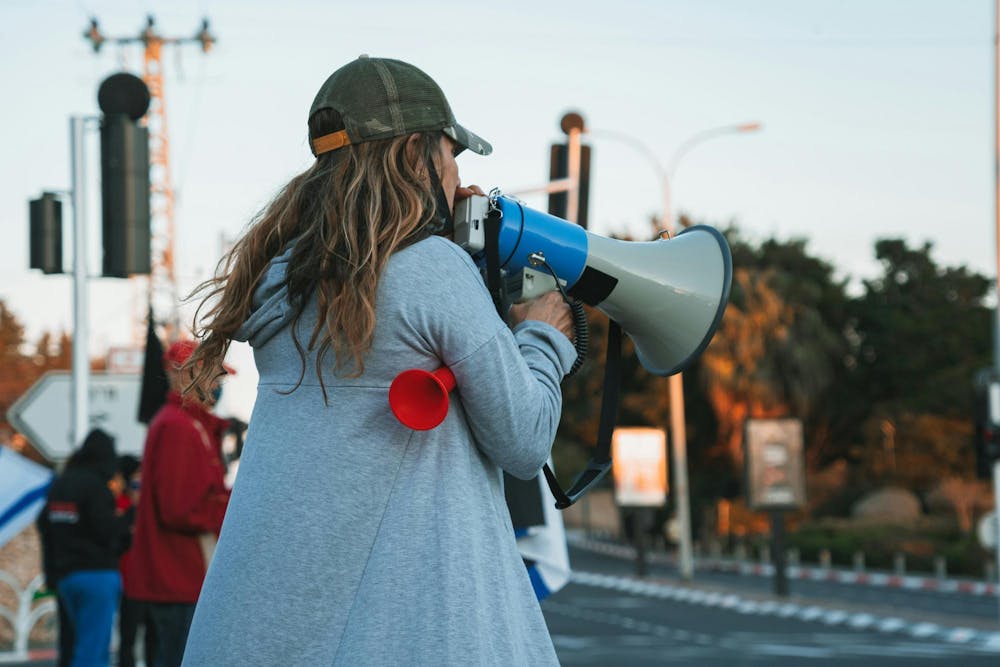The Fr. Ted Talks series on Oct. 28 and 29 claims to feature talks “from every corner of the Notre Dame community” to answer the Notre Dame Forum’s question, “What do we owe each other?” However, some voices in the University have been continually denied the opportunity to express their opinion in public settings and are categorically restricted from speaking at this event.
We both submitted Fr. Ted Talk proposals about a pressing issue on the minds of students at Notre Dame and universities across the country: the imperative to divest from the ongoing genocide in Gaza. We emphasized the need to more deeply consider how Catholic Social Teaching applies to the University’s investments. One of us was even preemptively invited by the organizers to submit a talk idea, yet the resulting proposal emphasizing the interconnectedness between climate impacts and conflict and the need to divest from both fossil fuels and war was denied. When asked why, the organizers indicated their preference to avoid “controversial topics.”
Yet what is a university if not a place to speak about “controversial” topics? Do we not owe it to each other to have difficult conversations? Do we not owe it to the 42,000 killed in Gaza including almost 17,000 children to have honest conversations about our institution's involvement? So, let’s free this year's Fr. Ted Talks from censorship. Here is what we could have discussed in this week’s forum:
When Desmond Tutu came to Notre Dame in 2003, he powerfully said “We are free today because of you.” A Notre Dame Magazine story featuring the talk noted that despite the fact that much of his audience was still only children when Apartheid ended in South Africa, the Archbishop was referencing the many students who pressured their universities, including the University of Notre Dame, to divest from Apartheid, contributing to the dissolution of South Africa’s system of racial segregation. Today, we owe each other the same commitment to justice and liberation that Notre Dame students and Archbishop Desmond Tutu shared then.
We face two glaring global ills that once again call for our divestment. One is the crisis of climate change, which threatens to submerge entire communities and cultures and increase hazards to life and livelihood in almost every corner of the world. The other is the crisis of unjust war. This is a particularly urgent priority for divestment because of the substantial roles that the United States government, American weapons manufacturers and American universities have played in supporting the devastation of an entire population in Gaza, which the International Court of Justice has deemed to be a plausible genocide. As the Notre Dame community benefits from a nearly twenty billion dollar endowment, its investments must be aligned with its greater values and mission.
The principles of Catholic Social Teaching include respect for the life and dignity of the human person, a call to family, community, participation, solidarity and care for God’s creation. These principles are central to the theory behind divestment, which intends to divorce ourselves and our resources from harm and instead commit them to whatever is good and fruitful for promoting dignity and sustainability in the world.
As climate activists, we are aware of the interconnectedness of our global communities. Decisions we make today in our own homes and campuses to support certain policies, industries and even conflicts, have a measurable global impact. Both of the authors have previously attended the UN climate negotiations as faith-based civil society observers. These conferences have been a chance for us to connect with global faith communities and witness the ways that our struggles are intertwined and our justice movements are intersectional. Advocating for peace in Gaza and climate justice in Tuvalu are both rooted in the same commitment to human dignity and care for our common home.
In order to do the important work of divestment, we need a commitment to solidarity — including solidarity with those who we may never encounter, yet still hold the same dignity we witness in each other. It also requires a commitment to community and participation, as we cannot accomplish change alone. We must stand together to weather the challenges of power, opposition and the momentum of the status quo. Notre Dame’s divestment from Apartheid came after multiple years of student-led advocacy. Yet, if we owe each other mutual freedom and liberation, as Desmond Tutu pointed out in his visit to Notre Dame, it is more than worth the repeated struggle.
In our shared commitment to justice, we must divest from both fossil fuels and weapons manufacturers. We have divested before; we owe it to each other to divest again and again.
Linnea Barron and Elsa Barron
junior and first-year Ph.D. candidate
Oct. 27










